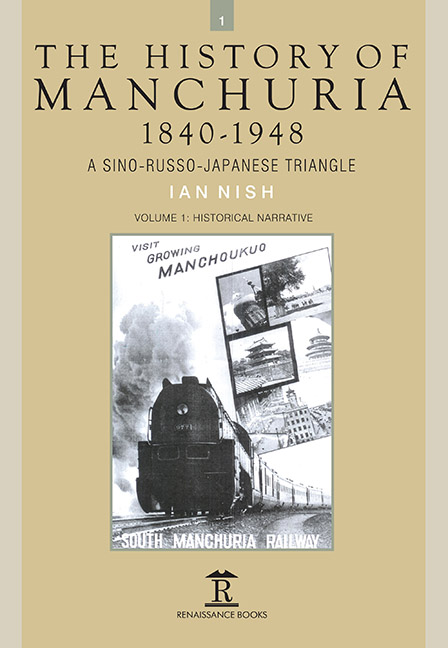Book contents
- Frontmatter
- Dedication
- Contents
- Preface
- Acknowledgements
- Name Conventions
- List of Abbreviations
- List of Maps
- Chapter One Manchuria and Russian Ambition, 1840s–1890s
- Chapter Two Sino-Japanese War and After, 1894–1900
- Chapter Three Prelude to the Russo-Japanese War, 1900–1905
- Chapter Four Railways, Reforms and Revolutions, 1906–1914
- Chapter Five Wartime Turmoil in Manchuria, 1915–1922
- Chapter Six Chang Tso-Lin’s Manchuria, 1922–28
- Chapter Seven Chinese Nationalism and Foreign Railways, 1929–1931
- Chapter Eight Lytton Commission in Manchuria, 1931–1932
- Chapter Nine Manchukuo: From Republic to Empire, 1933–1937
- Chapter Ten A Decade of Wars, 1938–1948
- Epilogue
- Map
- Select Bibliography
- Index
- Volume 2: Select Primary Sources
- Miscellaneous Frontmatter
- Dedication
- Miscellaneous Frontmatter
- Chapter 1 1840–1894
- Chapter 2 1895–1899
- Chapter 3 1900–1905
- Chapter 4 1905–1914
- Chapter 5 1915–1922
- Chapter 6 1922–1928
- Chapter 7 1929–1931
- Chapter 8 1931–1932
- Chapter 9 1933–1937
- Chapter 10 1938–1948
- Apendix Appeal by the Chinese Government
Chapter Three - Prelude to the Russo-Japanese War, 1900–1905
Published online by Cambridge University Press: 18 November 2023
- Frontmatter
- Dedication
- Contents
- Preface
- Acknowledgements
- Name Conventions
- List of Abbreviations
- List of Maps
- Chapter One Manchuria and Russian Ambition, 1840s–1890s
- Chapter Two Sino-Japanese War and After, 1894–1900
- Chapter Three Prelude to the Russo-Japanese War, 1900–1905
- Chapter Four Railways, Reforms and Revolutions, 1906–1914
- Chapter Five Wartime Turmoil in Manchuria, 1915–1922
- Chapter Six Chang Tso-Lin’s Manchuria, 1922–28
- Chapter Seven Chinese Nationalism and Foreign Railways, 1929–1931
- Chapter Eight Lytton Commission in Manchuria, 1931–1932
- Chapter Nine Manchukuo: From Republic to Empire, 1933–1937
- Chapter Ten A Decade of Wars, 1938–1948
- Epilogue
- Map
- Select Bibliography
- Index
- Volume 2: Select Primary Sources
- Miscellaneous Frontmatter
- Dedication
- Miscellaneous Frontmatter
- Chapter 1 1840–1894
- Chapter 2 1895–1899
- Chapter 3 1900–1905
- Chapter 4 1905–1914
- Chapter 5 1915–1922
- Chapter 6 1922–1928
- Chapter 7 1929–1931
- Chapter 8 1931–1932
- Chapter 9 1933–1937
- Chapter 10 1938–1948
- Apendix Appeal by the Chinese Government
Summary
IN 1900 EAST Asia was one of the greatest trouble-spots of the world. Five years earlier, China had been decisively defeated by her neighbour Japan and had had no alternative but to grant leases of ports to acquisitive powers who participated in ‘the scramble for China’ that took place in the late 1890s. Those which concluded leases in north China were Russia, Germany and Britain. The ports in question were ringed round the Gulf of Pechili and menaced the security of the Chinese capital. In 1900, because of the activities of the ‘Boxers’, the military forces of the world’s major Powers were gathered around Peking. The weakness of China was exposed. For her part, Japan was slowly to recover from the shattering humiliation the country had suffered in 1895 at the hands of the European Powers. She had withdrawn her troops from Weihaiwei, her sole base in China, in 1898. It was not that Japan was not deeply concerned with developments in China; but Japan’s leaders adopted a cautious policy and concentrated on building her military strength by increasing her army and buying new ships to reinforce her navy. The situation was, however, to change dramatically during the period covered by this chapter when Russia seemed to flex her muscles and assert herself in Manchuria while Japan took that seriously enough to assume a leadership role and take more positive action in opposing her.
BOXER DISTURBANCES IN MANCHURIA
While the attention of the world had been focussed on the blood-curdling events of the Legation Quarter in Peking, similar events had been unfolding in Manchuria from mid-July. There were three strands of Chinese activities which intensified against the Russian railway: the actions of the anti-railway irregulars; those of the Boxer ‘regulars’; and the involvement ultimately of the Chinese Imperial Army. They were united in opposing the appalling circumstances under which the Chinese Eastern and South Manchurian Railways had been built and the encroachment on their lands. The ‘irregulars’ did not want railways in their districts and commonly threw rails into the rivers and destroyed telegraphs and railway property by way of demonstrating their annoyance. The Boxers, a secret society which practised martial arts and was generally anti-Christian, became increasingly active after 1899.
- Type
- Chapter
- Information
- The History of Manchuria, 1840-1948A Sino-Russo-Japanese Triangle, pp. 39 - 56Publisher: Amsterdam University PressPrint publication year: 2016



